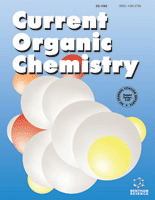To find the most relevant journal, please insert appropriate keyword to facilitate search.
Search Results: COC
Current Organic Chemistry
ISSN: 1385-2728 (Print)
eISSN: 1875-5348 (Online)
Impact Factor :
1.7
The frontier reviews provide the current state of knowledge in these fields and are written by selected experts who are internationally known for their outstanding research contributions. The journal also accepts high-quality research papers focusing on hot topics, highlights, and letters besides thematic issues in these fields. Current Organic Chemistry should prove to be of great interest to organic chemists in academia and industry, who wish to keep abreast with recent developments in key fields of organic chemistry.
Editor-in-Chief:
Budapest University of Technology and Economics
Budapest
Hungary
Indexed in:
Jisc (Formerly: SHERPA/RoMEO), ScienceGate, Portico, Scopus, Engineering Village/Chimica, OpenAire, Journal Citation Reports/Science Edition, Science Citation Index Expanded™ (SciSearch®), Essential Science Indicators, Current Contents®/Physical, Chemical & Earth Sciences, Ulrich's Periodicals Directory, Suweco CZ, Scilit, QOAM, PubsHub, Norwegian Register, MediaFinder®-Standard Periodical Directory, JournalTOCs, J-Gate, Index Copernicus, Google Scholar, Genamics Journal Seek, ERA 2018, EBSCO, Dimensions, CNKI Scholar, Chemical Abstracts Service/SciFinder, Cabell's Directory/Journalytics, British Library... View all
Special Issues With Active Call for Papers
Hybrid-Materials Catalyzed Conversion of Molecules and Substances
To address the global energy and environmental issues, and inspired by the photosynthesis of plants, scientists have material shifted their focus from traditional chemistry to novel ones to discover new substances and molecules. Hybrid materials with their unique synergistic effects, interface regulation capabilities, and functional integration have emerged as a core system driving transformative changes across multiple fields of organic chemistry. The collective efforts of many scientists, these materials have advanced the transformation of substances... see more
Unveiling New Pathways in the Progress of Heterocyclic Chemistry with Applications in Industry and Therapeutics
This proposal introduces a special issue titled "Unveiling New Pathways in the Progress of Heterocyclic Chemistry with Applications in Industry and Therapeutics," aimed at fostering advancements in Heterocyclic Chemistry and its multifaceted applications. Heterocyclic compounds, pivotal in numerous industrial and therapeutic settings, represent a cornerstone of chemical and biomedical research. This special issue seeks to bridge the gap between innovative synthetic methodologies and their practical applications, catalyzing progress in pharmaceuticals, agrochemicals, materials science, and beyond.... see more
From Lab Bench to Algorithm: The Future of Organic Chemistry Powered by AI
Organic chemistry, with its intricate dance of molecules and reactions, is undergoing a transformation fuelled by the power of Artificial Intelligence (AI) and Machine Learning (ML). The integration of AI/ML with Organic Chemistry is revolutionizing the field by enhancing the efficiency and accuracy of chemical research and development. These technologies facilitate the prediction of molecular properties, reaction outcomes, and synthesis pathways, significantly accelerating drug discovery and material science advancements. AI/ML algorithms analyze vast datasets, identify... see more
Porphyrazine, Its Analogues and Their Metalcomplexes: Theoretical Consideration and Experimental Data
Porphyrazines are specific analogues of porphyrins – macrocyclic compounds with tetrapyrrole macrocycles, which are key components of a number of natural compounds, in particular chlorophyll and heme, playing a decisive role in the processes of reversible transfer of oxygen molecules in living organisms. They differ from porphyrins in that their meso-positions contain nitrogen atoms, not carbon atoms, as is the case in porphyrins. One of the most important representatives of porphyrazines is phthalocyanine, in which... see more
Natural Terpenes: The Chemistry and Biological Significance
Natural organic compounds such as alkaloid, flavonoid, terpene, protein, and saccharide have been widely applied in the fields of medicine, food supplements, agriculture, cosmetics and material sciences. Terpenes as an important natural products present intensively structural diversity and widely pharmacological properties. As an important origin of medicine, the chemistry and biological significance of natural terpenes have always been attractive to find out natural medicines or natural compound based medicines since ancient times. With the development... see more
Recent Advances in Catalytic Hydrogenations for Organic Syntheses
Catalytic hydrogenation is a typical reduction method in the fine chemical industry (e.g. pharmaceutical industry) for producing important and valuable organic chemicals. It can be realized in both heterogeneous and homogeneous ways, but different selectivity (chemo-, regio- or stereoselectivity) problems can arise in case of more reducible functional groups. In addition, the reduction of compounds having catalyst poisoning characteristics (typical substances containing nitrogen, phosphorus or sulphur) can be difficult, because the activity of the catalyst... see more
